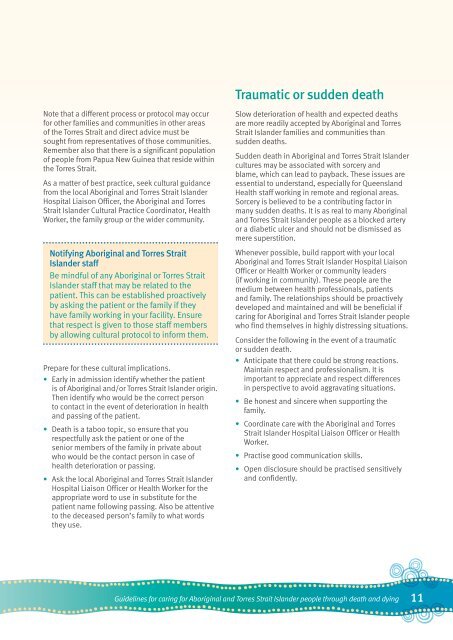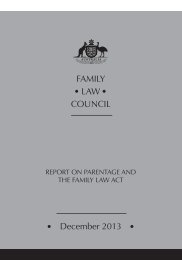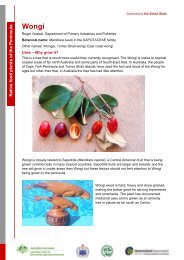sad news sorry business
84uyJtC1F
84uyJtC1F
Create successful ePaper yourself
Turn your PDF publications into a flip-book with our unique Google optimized e-Paper software.
Traumatic or sudden death<br />
Note that a different process or protocol may occur<br />
for other families and communities in other areas<br />
of the Torres Strait and direct advice must be<br />
sought from representatives of those communities.<br />
Remember also that there is a significant population<br />
of people from Papua New Guinea that reside within<br />
the Torres Strait.<br />
As a matter of best practice, seek cultural guidance<br />
from the local Aboriginal and Torres Strait Islander<br />
Hospital Liaison Officer, the Aboriginal and Torres<br />
Strait Islander Cultural Practice Coordinator, Health<br />
Worker, the family group or the wider community.<br />
Notifying Aboriginal and Torres Strait<br />
Islander staff<br />
Be mindful of any Aboriginal or Torres Strait<br />
Islander staff that may be related to the<br />
patient. This can be established proactively<br />
by asking the patient or the family if they<br />
have family working in your facility. Ensure<br />
that respect is given to those staff members<br />
by allowing cultural protocol to inform them.<br />
Prepare for these cultural implications.<br />
• Early in admission identify whether the patient<br />
is of Aboriginal and/or Torres Strait Islander origin.<br />
Then identify who would be the correct person<br />
to contact in the event of deterioration in health<br />
and passing of the patient.<br />
• Death is a taboo topic, so ensure that you<br />
respectfully ask the patient or one of the<br />
senior members of the family in private about<br />
who would be the contact person in case of<br />
health deterioration or passing.<br />
• Ask the local Aboriginal and Torres Strait Islander<br />
Hospital Liaison Officer or Health Worker for the<br />
appropriate word to use in substitute for the<br />
patient name following passing. Also be attentive<br />
to the deceased person’s family to what words<br />
they use.<br />
Slow deterioration of health and expected deaths<br />
are more readily accepted by Aboriginal and Torres<br />
Strait Islander families and communities than<br />
sudden deaths.<br />
Sudden death in Aboriginal and Torres Strait Islander<br />
cultures may be associated with sorcery and<br />
blame, which can lead to payback. These issues are<br />
essential to understand, especially for Queensland<br />
Health staff working in remote and regional areas.<br />
Sorcery is believed to be a contributing factor in<br />
many sudden deaths. It is as real to many Aboriginal<br />
and Torres Strait Islander people as a blocked artery<br />
or a diabetic ulcer and should not be dismissed as<br />
mere superstition.<br />
Whenever possible, build rapport with your local<br />
Aboriginal and Torres Strait Islander Hospital Liaison<br />
Officer or Health Worker or community leaders<br />
(if working in community). These people are the<br />
medium between health professionals, patients<br />
and family. The relationships should be proactively<br />
developed and maintained and will be beneficial if<br />
caring for Aboriginal and Torres Strait Islander people<br />
who find themselves in highly distressing situations.<br />
Consider the following in the event of a traumatic<br />
or sudden death.<br />
• Anticipate that there could be strong reactions.<br />
Maintain respect and professionalism. It is<br />
important to appreciate and respect differences<br />
in perspective to avoid aggravating situations.<br />
• Be honest and sincere when supporting the<br />
family.<br />
• Coordinate care with the Aboriginal and Torres<br />
Strait Islander Hospital Liaison Officer or Health<br />
Worker.<br />
• Practise good communication skills.<br />
• Open disclosure should be practised sensitively<br />
and confidently.<br />
Guidelines for caring for Aboriginal and Torres Strait Islander people through death and dying<br />
11




